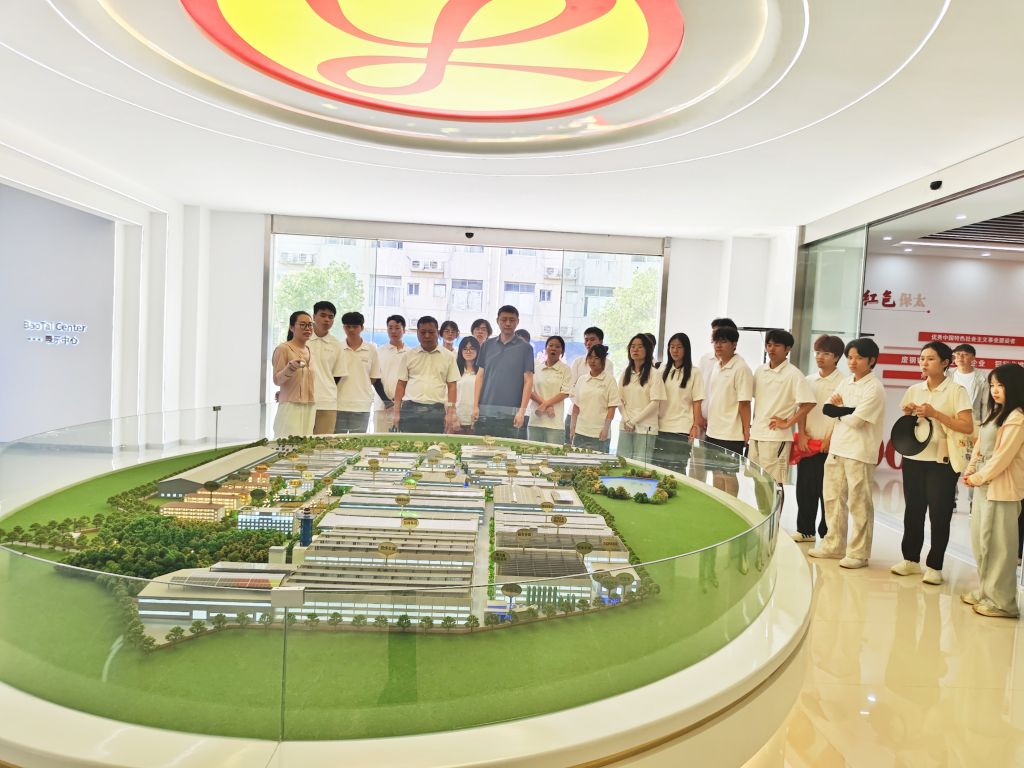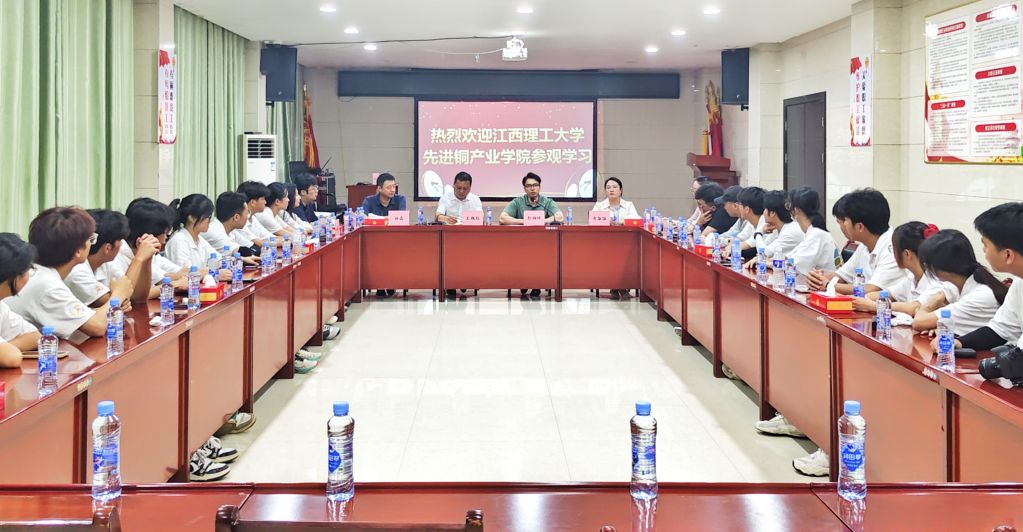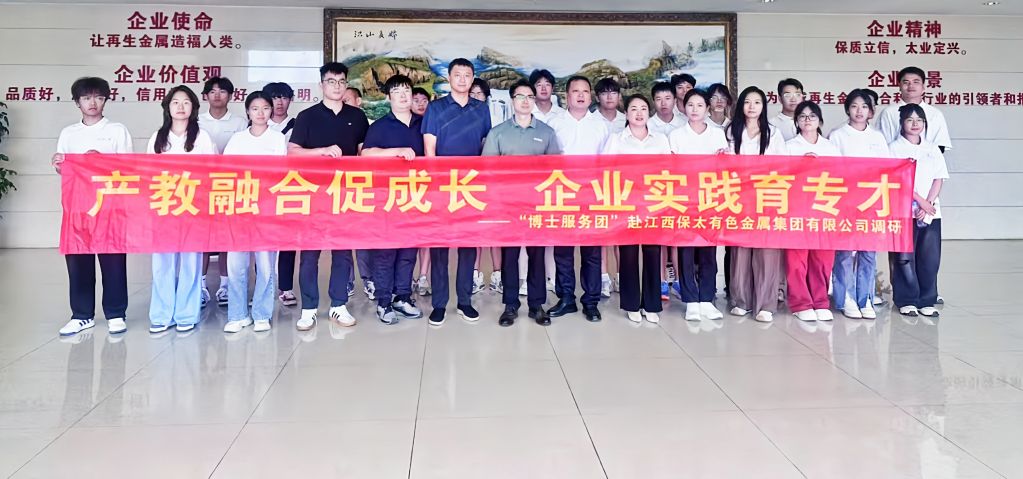The doctoral team from the Advanced Copper Industry College of Jiangxi University of Science and Technology conducted social practice activities at Baotai Group
Time:2025-07-18 11:43:15 Source:江西保太集團(tuán)-江西保太有色金屬集團(tuán)有限公司 View Rate:115
Summary: On July 16th, the doctoral group and student practice team from the Advanced Copper Industry College of Jiangxi University of Science and Technology visited Jiangxi Baotai Nonferrous Metals Group Co., Ltd. to carry out social practice activities under the theme of "Going to the Countryside".
On July 16th, the doctoral group and student practice team from the Advanced Copper Industry College of Jiangxi University of Science and Technology visited Jiangxi Baotai Nonferrous Metals Group Co., Ltd. to carry out "Three Down to the Countryside" social practice activities. The event focused on fields such as material science and intelligent manufacturing, establishing a communication platform for collaborative innovation between schools and enterprises, and facilitating the deep integration of industry, academia, and research, as well as technological upgrading for enterprises.
Wu Yangqin, the Executive Vice President of Baotai Group, warmly welcomed the practice team and led the teachers and students into the Digital Achievement Exhibition Center, where the development trajectory of the group was clearly displayed. In the copper (aluminum) production workshop, intelligently upgraded equipment and newly added precision units worked together to gradually transform recycled metals into shiny copper and aluminum products, vividly demonstrating the core strength of smart factories. In the laboratory, researchers were intently operating spectrometers, metallographic microscopes, and other precision equipment, conducting detailed testing and analysis of the composition, structure, and performance parameters of recycled metals. They were tackling topics such as recycled metal purification technology and new alloy formulations. Every data comparison and experimental adjustment provided solid technical support for the group's green production and efficient processing, allowing the teachers and students to deeply feel Baotai Group's profound foundation driven by research and development.

At the symposium, Peng Bingfeng, the chairman of the group, introduced that the group adheres to the concept of "one concentric circle, two deep processing stages, three major industries, and four major industrial chains". With "Baotai price" as the guiding price for the global renewable metal industry (with a daily website visit of 100,000 people), the group has established the Baotai Renewable Metal Industrialization Research Institute, focusing on the research and development of renewable metal utilization and processing technologies. By reducing energy consumption through technological transformation and generating over 25 million kWh of solar power annually, the group practices green development. The iCarbon energy and carbon digitalization platform built utilizes the Internet of Things to manage energy and carbon emissions. The energy and carbon dashboard supported by big data can display, analyze, predict, and assist in formulating carbon reduction strategies, providing solutions for the green transformation of the industry. The group has also won authoritative awards such as "National Excellent Intelligent Factory", "National Postdoctoral Workstation", "National High-tech Enterprise", and "National Green Factory". In addition, Chairman Peng Bingfeng patiently answered students' concerns about employment directions in related majors and enterprise recruitment needs, illustrating that Baotai Group is currently in a rapid development stage and has a high demand for composite talents with professional skills and intelligent manufacturing abilities in fields such as intelligent manufacturing and green production. The group values professionalism and ambition in talent recruitment, with performance bonuses increasing with personal ability and being at a medium to high level in the industry and region.

Finally, Wang Zhenhuan, the Secretary of the Party Committee of the Advanced Copper Industry College at Jiangxi University of Science and Technology, expressed his gratitude to Baotai Group for their warm reception and experience sharing. He pointed out, "Universities and colleges have been deeply involved in scientific research in fields such as material science and intelligent manufacturing, accumulating a wealth of theoretical achievements. We hope to take this event as an opportunity to strengthen cooperation between enterprises and universities, establish a long-term collaborative mechanism, and promote the transition of scientific research achievements from the 'laboratory' to the 'production line', realizing industrial application and allowing knowledge innovation to truly empower enterprise development and facilitate industry upgrading."

In the future, both parties will continue to deepen their cooperation and work together in areas such as technology research and development and talent cultivation. Through the "industry-university-research" integration model, universities can provide professional talents for enterprise development, while enterprises can offer practical platforms and excellent employment opportunities for university talents, achieving mutual benefit and win-win results. This will inject new momentum into the high-quality development of the non-ferrous metals industry, writing a new chapter of collaborative innovation, green and intelligent manufacturing between schools and enterprises.

 Service Hotline:
Service Hotline:



 Jiangxi Public Network Security No.36062202000027
Jiangxi Public Network Security No.36062202000027